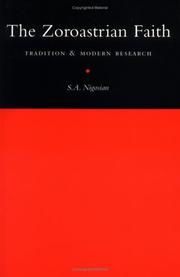| Listing 1 - 3 of 3 |
Sort by
|
Book
ISBN: 9004269223 9789004269224 9789004269217 9004269215 1306858623 9781306858625 Year: 2014 Publisher: Boston
Abstract | Keywords | Export | Availability | Bookmark
 Loading...
Loading...Choose an application
- Reference Manager
- EndNote
- RefWorks (Direct export to RefWorks)
The Pahlavi Widēwdād (Vidēvdād), The Law (Serving to Keep) Demons Away , a fifth-century Middle Persian commentary on the Avestan Vidēvdād , describes rules and regulations that serve to prevent pollution caused by dead matter, menstrual discharges, and other agents. It recognizes the perpetual presence of the demons, the forces of the Evil Spirit –forces that should be fought through law-abiding conduct. In spite of its formidable textual problems, the commentary provides an invaluable quarry for the rules of the Zoroastrian community through its citation of regulations for the conduct of its members. Many topics are covered, from jurisprudence to penalties, procedures for dealing with pollution, purification, and arrangements for funerals. Viewed together, they provide the reader with an exquisite interlace of a community’s concerns.

ISBN: 1282856707 9786612856709 0773564381 9780773564381 0773511334 9780773511330 077351144X 9780773511446 9781282856707 661285670X 0773511334 9780773511330 Year: 1993 Publisher: Montréal [Que.] McGill-Queen's University Press
Abstract | Keywords | Export | Availability | Bookmark
 Loading...
Loading...Choose an application
- Reference Manager
- EndNote
- RefWorks (Direct export to RefWorks)
The Zoroastrian Faith is organized around five themes: an account of Zoroaster's life and work; discussion of the development and spread of Zoroastrianism from its beginnings to the present; description of the sacred writings and religious documents of the faith; an analysis of the basic Zoroastrian beliefs and their influence on Judaism, Christianity, and Islam; and a description of the prescribed observances. In this historical and analytical study, S.A. Nigosian cuts through these problems to present a concise, systematic survey of Zoroastrianism. This book will intrigue scholars and general readers alike. A glossary and bibliography are provided as aids for further study
Zoroastrianism. --- Mazdaism --- Mazdeism --- Religions --- Mithraism --- Zoroastrianism --- 295.4 --- 295.4 Zoroastrisme. Mazdaisme. Zend-Avesta. Zarathoestra --- Zoroastrisme. Mazdaisme. Zend-Avesta. Zarathoestra --- Religions. --- Comparative religion --- Denominations, Religious --- Religion, Comparative --- Religions, Comparative --- Religious denominations --- World religions --- Civilization --- Gods --- Religion --- Zoroaster --- history --- scripture --- teachings --- ancient Persia --- 550 BCE --- Judaism --- Christianity --- Islam
Book
ISBN: 9780520286191 9780520961531 0520286197 9780520292451 0520961536 0520292456 Year: 2015 Volume: 56 Publisher: Oakland, California
Abstract | Keywords | Export | Availability | Bookmark
 Loading...
Loading...Choose an application
- Reference Manager
- EndNote
- RefWorks (Direct export to RefWorks)
Christian communities flourished during late antiquity in a Zoroastrian political system, known as the Iranian Empire, that integrated culturally and geographically disparate territories from Arabia to Afghanistan into its institutions and networks. Whereas previous studies have regarded Christians as marginal, insular, and often persecuted participants in this empire, Richard Payne demonstrates their integration into elite networks, adoption of Iranian political practices and imaginaries, and participation in imperial institutions. The rise of Christianity in Iran depended on the Zoroastrian theory and practice of hierarchical, differentiated inclusion, according to which Christians, Jews, and others occupied legitimate places in Iranian political culture in positions subordinate to the imperial religion. Christians, for their part, positioned themselves in a political culture not of their own making, with recourse to their own ideological and institutional resources, ranging from the writing of saints' lives to the judicial arbitration of bishops. In placing the social history of East Syrian Christians at the center of the Iranian imperial story, A State of Mixture helps explain the endurance of a culturally diverse empire across four centuries.
Christianity and other religions --- Christianity and politics --- Christians --- Zoroastrianism --- History --- Social conditions --- Relations --- Christianity --- Iran --- Civilization --- 281 <55> --- 295.4 --- Religious adherents --- Mazdaism --- Mazdeism --- Religions --- Mithraism --- Church and politics --- Politics and Christianity --- Politics and the church --- Political science --- Zoroastrianism. --- Christianity. --- Oosters christendom--Iran --- Zoroastrisme. Mazdaisme. Zend-Avesta. Zarathoestra --- Political aspects --- 295.4 Zoroastrisme. Mazdaisme. Zend-Avesta. Zarathoestra --- Relations&delete& --- Christianity and other religions - Zoroastrianism --- Christianity and politics - Iran - History - To 1500 --- Christians - Iran - Social conditions --- Zoroastrianism - Relations - Christianity --- Martyres Persae --- Abdas, Haso, Isaac et soc, mm. in Perside --- Acepsimas, Ioseph et Aeithalas mm. in Perside --- Adurhormizd praefectus m. in Perside --- Anahid v. m. in Perside --- Eustathius de Mcxeta, m. in Iberia --- Heliodorus, Dosas, Mareabes, Abdiesus et soc. mm. in Perside --- Iacobus notarius m. in Perside --- Iazdbozid seu Isbozetes m. in Persia --- Iazdin solidarius in Perside --- Martyres Beth-Seleucienses --- Miles, Aborsam et Sinoi mm. in Perside --- Narses m. Seleuciae --- Perozes m. in Perside --- Pethion m. in Perside --- Phusik m. Ledan --- Sira m. in Perside --- Symeon Bar-Sabbae, Abdhaicla, Hananias et soc. mm. Seleuciae et Ctesiphonte --- Iran - Civilization - To 640 --- ancient middle eastern religions. --- ancient persia. --- ancient political systems. --- ancient religions. --- christian inclusion in late antiquity. --- christian law. --- christianity and politics. --- christianity. --- christians in iran. --- comparative religion. --- early iranian civilization. --- history of religion in iran. --- iranian political practice. --- monotheistic religions. --- religion in the mediterranean. --- religion in the near east. --- religion. --- religions of persia. --- zoroastrian empire. --- zoroastrianism.
| Listing 1 - 3 of 3 |
Sort by
|

 Search
Search Feedback
Feedback About UniCat
About UniCat  Help
Help News
News